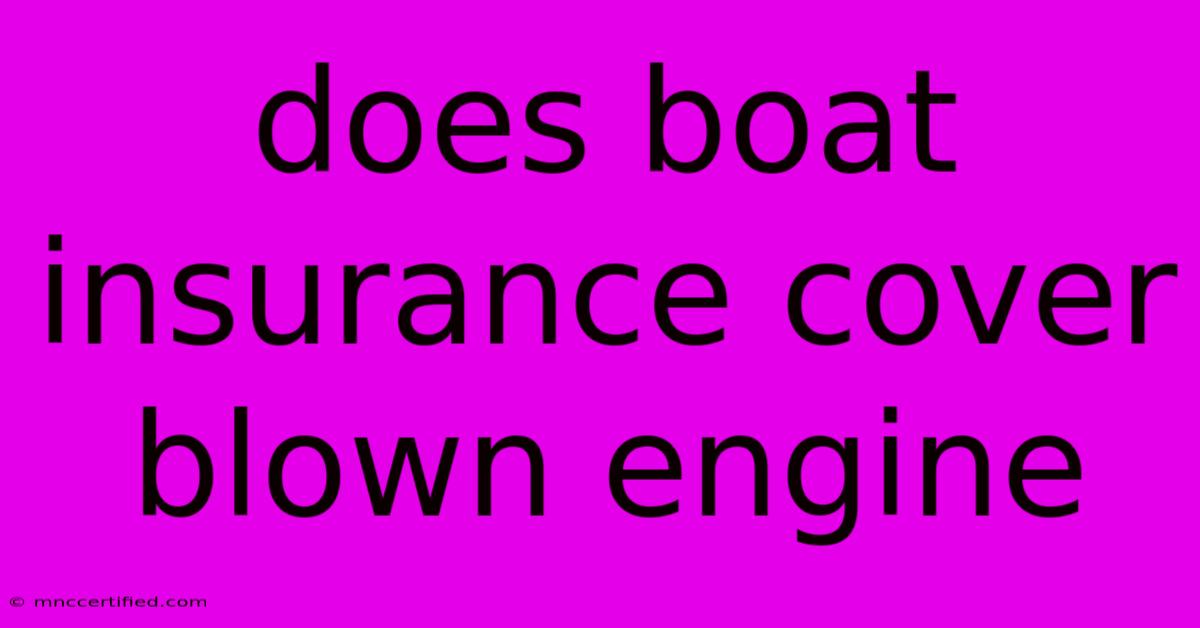Does Boat Insurance Cover Blown Engine

Table of Contents
Does Boat Insurance Cover a Blown Engine? Navigating the Waters of Coverage
The dreaded "clunk" or "bang" followed by the unmistakable silence of a dead engine can turn a joyous day on the water into a stressful nightmare. One of the first questions that pops into mind: does my boat insurance cover a blown engine? The short answer? It depends.
While boat insurance often includes coverage for mechanical breakdowns, the specifics vary greatly depending on your policy and the cause of the engine failure. Let's dive deeper into the factors that determine whether your insurance will cover a blown engine.
Understanding Your Policy: The Key to Coverage
Your boat insurance policy is your roadmap. It outlines the perils covered, the limits of coverage, and any exclusions. Carefully reading your policy, particularly the section on mechanical breakdown coverage, is crucial. Here are some key things to look for:
- Covered perils: Your policy may list specific mechanical issues covered, such as engine failure due to wear and tear, sudden and accidental damage, or manufacturer defects.
- Exclusions: Policies often exclude coverage for certain situations like pre-existing conditions, lack of regular maintenance, or intentional damage.
- Deductible: This is the amount you pay out-of-pocket before your insurance kicks in. A higher deductible usually means lower premiums, but it can be a significant cost if your engine fails.
Common Causes of Engine Failure and Coverage
While every situation is unique, here's a breakdown of common engine failure causes and how they might be covered:
1. Wear and Tear:
This refers to the natural deterioration of engine parts due to use and time. Many boat insurance policies exclude coverage for wear and tear, but some offer optional extended warranty-type coverage that can provide protection.
2. Sudden and Accidental Damage:
This refers to damage caused by unforeseen events like a collision, grounding, or debris ingestion. Most boat insurance policies cover sudden and accidental damage to engines, including blown engines resulting from these events.
3. Manufacturer Defects:
If the engine fails due to a known manufacturing defect, your policy may cover the repair or replacement costs. However, proof of the defect may be required.
4. Lack of Maintenance:
Neglecting regular maintenance can lead to engine failure. Most policies exclude coverage for damage caused by lack of maintenance, so keeping your engine in good working order is essential.
5. Intentional Damage:
If the engine failure is a result of deliberate action, such as sabotage, your policy likely won't provide coverage.
Seeking Coverage for a Blown Engine: What to Do
If your engine fails, follow these steps to ensure smooth sailing with your insurance company:
- Contact your insurance company immediately: Report the engine failure and follow their reporting procedures.
- Provide detailed documentation: Gather any evidence you have about the cause of the engine failure, including repair receipts, maintenance records, and witness statements.
- Follow your insurer's instructions: They may require you to have the engine inspected by a qualified mechanic or submit the boat for an appraisal.
- Be patient: The insurance claim process can take time, so stay in communication with your insurance company throughout.
Navigating Your Way to a Solution
A blown engine can be a major setback, but understanding your boat insurance coverage and following the right steps can help you navigate the process successfully. Remember, prevention is always better than cure, so prioritize regular maintenance and consult with a qualified marine mechanic to help prevent engine failures. By being proactive, you can ensure your boat remains a source of enjoyment, not stress.

Thank you for visiting our website wich cover about Does Boat Insurance Cover Blown Engine. We hope the information provided has been useful to you. Feel free to contact us if you have any questions or need further assistance. See you next time and dont miss to bookmark.
Featured Posts
-
India Vs South Africa T20 I Match Highlights
Nov 09, 2024
-
Whos Fighting On The Paul Vs Tyson Card
Nov 09, 2024
-
Tony Pope State Farm Insurance Agent
Nov 09, 2024
-
Bronny James G League Debut Tickets Gone
Nov 09, 2024
-
Its An Honor Rashida Jones On Quincy
Nov 09, 2024